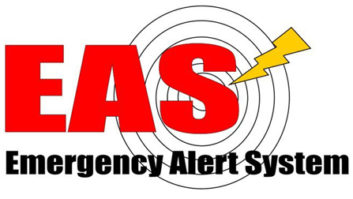Digital Alert Systems is hopeful the FCC intends to act quickly on revising the Part 11 rules governing EAS in order to give participants certainty and time to finalize preparations to upgrade to the Common Alerting Protocol.
The company participated in a Federal Communications Bar Association meeting on EAS recently in Washington. In a regulatory newsletter to customers, the company said Ed Czarnecki, DAS senior director for strategy, development & regulatory affairs, attended the meeting, which also was attended by personnel from the FCC, FEMA and NAB.
Under the new CAP-EAS, stations would connect to the FEMA message aggregator over the Internet to receive the alert to be re-transmitted. Some stations in small markets have told the commission that’s an issue in rural areas with limited or slow Internet connectivity.
“When asked about the issue of Internet connectivity, the FCC noted that numerous parties have mentioned multiple methods of accessing the Internet, including alternatives to standard options,” DAS states in its newsletter summary. “They further reminded EAS participants it would behoove them to start seriously investigating those options and alternatives now.”
Czarnecki suggested the need for more open communication of what the federal government intends regarding CAP and next-gen alerting and what specifically the government expects EAS participants to accomplish before the new June 30, 2012 deadline for stations to have CAP-EAS equipment installed and operational. The company referred to the “unprecedented amount of confusion in the industry regarding federal alert and warning activities.”
Meanwhile, regarding the upcoming Nov. 9 national EAS test, DAS says “CAP EAS vendors have received instructions for beta testing their products against the IPAWS server, which we have been doing successfully.” Radio World reported and DAS reiterates that FEMA intends to make its CAP “aggregator” operational by the end of this week, meaning new CAP-EAS gear should be able to monitor the IPAWS servers.
The newsletter also includes an analysis (PDF) of the FCC’s response to the broadcaster’s petition to delay the CAP-EAS compliance deadline from the Sept. 30 deadline.










